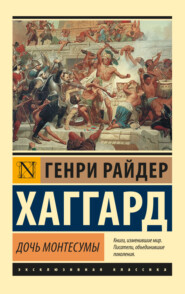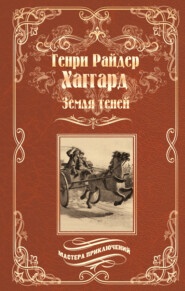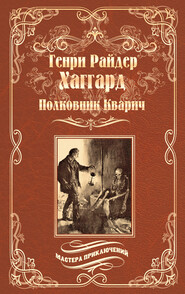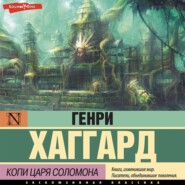По всем вопросам обращайтесь на: info@litportal.ru
(©) 2003-2024.
✖
The World's Desire
Настройки чтения
Размер шрифта
Высота строк
Поля
“But when will the Lady Hathor sing upon her tower top?” said Rei, “for the Stranger desires to see her and hear her.”
The temple priest bowed before the Wanderer, and answered gravely:
“On the third morn from now the Holy Hathor shows herself upon the temple’s top,” he said; “but thou, mighty lord, who art risen from the sea, hearken to my warning, and if, indeed, thou art no god, dare not to look upon her beauty. If thou dost look, then thy fate shall be as the fate of those who have looked before, and have loved and have died for the sake of the Hathor.”
“No god am I,” said the Wanderer, laughing, “yet, perchance, I shall dare to look, and dare to face whatever it be that guards her, if my heart bids me see her nearer.”
“Then there shall be an end of thee and thy wanderings,” said the priest. “Now follow me, and I will show thee those men who last sought to win the Hathor.”
He took him by the hand and led him through passages hewn in the walls till they came to a deep and gloomy cell, where the golden armour of the Wanderer shone like a lamp at eve. The cell was built against the city wall, and scarcely a thread of light came into the chink between roof and wall. All about the chamber were baths fashioned of bronze, and in the baths lay dusky shapes of dark-skinned men of Egypt. There they lay, and in the faint light their limbs were being anointed by some sad-faced attendants, as folk were anointed by merry girls in the shining baths of the Wanderer’s home. When Rei and Eperitus came near, the sad-faced bath-men shrank away in shame, as dogs shrink from their evil meat at night when a traveller goes past.
Marvelling at the strange sight, the bathers and the bathed, the Wanderer looked more closely, and his stout heart sank within him. For all these were dead who lay in the baths of bronze, and it was not water that flowed about their limbs, but evil-smelling natron.
“Here lie those,” said the priest, “who last strove to come near the Holy Hathor, and to pass into the shrine of the temple where night and day she sits and sings and weaves with her golden shuttle. Here they lie, the half of a score. One by one they rushed to embrace her, and one by one they were smitten down. Here they are being attired for the tomb, for we give them all rich burial.”
“Truly,” quoth the Wanderer, “I left the world of Light behind me when I looked on the blood-red sea and sailed into the black gloom off Pharos. More evil sights have I seen in this haunted land than in all the cities where I have wandered, and on all the seas that I have sailed.”
“Then be warned,” said the priest, “for if thou dost follow where they went, and desire what they desired, thou too shalt lie in yonder bath, and be washed of yonder waters. For whatever be false, this is true, that he who seeks love ofttimes finds doom. But here he finds it most speedily.”
The Wanderer looked again at the dead and at their ministers, and he shuddered till his harness rattled. He feared not the face of Death in war, or on the sea, but this was a new thing. Little he loved the sight of the brazen baths and those who lay there. The light of the sun and the breath of air seemed good to him, and he stepped quickly from the chamber, while the priest smiled to himself. But when he reached the outer air, his heart came back to him, and he began to ask again about the Hathor – where she dwelt, and what it was that slew her lovers.
“I will show thee,” answered the priest, and brought him through the Hall of Assembly to a certain narrow way that led to a court. In the centre of the court stood the holy shrine of the Hathor. It was a great chamber, built of alabaster, lighted from the roof alone, and shut in with brazen doors, before which hung curtains of Tyrian web. From the roof of the shrine a stairway ran overhead to the roof of the temple and so to the inner pylon tower.
“Yonder, Stranger, the holy Goddess dwells within the Alabaster Shrine,” said the priest. “By that stair she passes to the temple roof, and thence to the pylon top. There by the curtains, once in every day, we place food, and it is drawn into the sanctuary, how we know not, for none of us have set foot there, nor seen the Hathor face to face. Now, when the Goddess has stood upon the pylon and sung to the multitude below, she passes back to the shrine. Then the brazen outer doors of the temple court are thrown wide and the doomed rush on madly, one by one, towards the drawn curtains. But before they pass the curtains they are thrust back, yet they strive to pass. Then we hear a sound of the clashing of weapons and the men fall dead without a word, while the song of the Hathor swells from within.”
“And who are her swordsmen?” said the Wanderer.
“That we know not, Stranger; no man has lived to tell. Come, draw near to the door of the shrine and hearken, maybe thou wilt hear the Hathor singing. Have no fear; thou needst not approach the guarded space.”
Then the Wanderer drew near with a doubting heart, but Rei the Priest stood afar off, though the temple priests came close enough. At the curtains they stopped and listened. Then from within the shrine there came a sound of singing wild and sweet and shrill, and the voice of it stirred the Wanderer strangely, bringing to his mind memories of that Ithaca of which he was Lord and which he should see no more; of the happy days of youth, and of the God-built walls of windy Ilios. But he could not have told why he thought on these things, nor why his heart was thus strangely stirred within him.
“Hearken! the Hathor sings as she weaves the doom of men,” said the priest, and as he spoke the singing ended.
Then the Wanderer took counsel with himself whether he should then and there burst the doors and take his fortune, or whether he should forbear for that while. But in the end he determined to forbear and see with his own eyes what befell those who strove to win the way.
So he drew back, wondering much; and, bidding farewell to the aged priest, he went with Rei, the Master Builder, through the town of Tanis, where the Apura were still spoiling the people of Khem, and he came to the Palace where he was lodged. Here he turned over in his mind how he might see the strange woman of the temple, and yet escape the baths of bronze. There he sat and thought till at length the night drew on, and one came to summon him to sup with Pharaoh in the Hall. Then he rose up and went, and meeting Pharaoh and Meriamun the Queen in the outer chamber, passed in after them to the Hall, and on to the daïs which he had held against the rabble, for the place was clear of dead, and, save for certain stains upon the marble floor that might not be washed away, and for some few arrows that yet were fixed high up in the walls or in the lofty roof, there was nothing to tell of the great fray that had been fought but one day gone.
Heavy was the face of Pharaoh, and the few who sat with him were sad enough because of the death of so many whom they loved, and the shame and sorrow that had fallen upon Khem. But there were no tears for her one child in the eyes of Meriamun the Queen. Anger, not grief, tore her heart because Pharaoh had let the Apura go. For ever as they sat at the sad feast there came a sound of the tramping feet of armies, and of lowing cattle, and songs of triumph, sung by ten thousand voices, and thus they sang the song of the Apura: —
A lamp for our feet the Lord hath litten,
Signs hath He shown in the Land of Khem.
The Kings of the Nations our Lord hath smitten,
His shoe hath He cast o’er the Gods of them.
He hath made Him a mock of the heifer of Isis,
He hath broken the chariot reins of Ra,
On Yakûb He cries, and His folk arises,
And the knees of the Nation are loosed in awe.
He gives us their goods for a spoil to gather,
Jewels of silver, and vessels of gold;
For Yahveh of old is our Friend and Father,
And cherisheth Yakûb He chose of old.
The Gods of the Peoples our Lord hath chidden,
Their courts hath He filled with His creeping things;
The light of the face of the Sun he hath hidden,
And broken the scourge in the hands of kings.
He hath chastened His people with stripes and scourges,
Our backs hath He burdened with grievous weights,
But His children shall rise as a sea that surges,
And flood the fields of the men He hates.
The Kings of the Nations our Lord hath smitten,
His shoe hath He cast o’er the Gods of them,
But a lamp for our feet the Lord hath litten,
Wonders hath he wrought in the Land of Khem.
Thus they sang, and the singing was so wild that the Wanderer craved leave to go and stand at the Palace gate, lest the Apura should rush in and spoil the treasure-chamber.
The King nodded, but Meriamun rose, and went with the Wanderer as he took his bow and passed to the great gates.
There they stood in the shadow of the gates, and this is what they beheld. A great light of many torches was flaring along the roadway in front. Then came a body of men, rudely armed with pikes, and the torchlight shone on the glitter of bronze and on the gold helms of which they had spoiled the soldiers of Khem. Next came a troop of wild women, dancing, and beating timbrels, and singing the triumphant hymn of scorn.
Next, with a space between, tramped eight strong black-bearded men, bearing on their shoulders a great gilded coffin, covered with carven and painted signs.
“It is the body of their Prophet, who brought them hither out of their land of hunger,” whispered Meriamun. “Slaves, ye shall hunger yet in the wilderness, and clamour for the flesh-pots of Khem!”
Then she cried in a loud voice, for her passion overcame her, and she prophesied to those who bare the coffin, “Not one soul of you that lives shall see the land where your conjurer is leading you! Ye shall thirst, ye shall hunger, ye shall call on the Gods of Khem, and they shall not hear you; ye shall die, and your bones shall whiten the wilderness. Farewell! Set go with you. Farewell!”
So she cried and pointed down the way, and so fierce was her gaze, and so awful were her words, that the people of the Apura trembled and the women ceased to sing.
The Wanderer watched the Queen and marvelled. “Never had woman such a hardy heart,” he mused; “and it were ill to cross her in love or war!”
“They will sing no more at my gates,” murmured Meriamun, with a smile. “Come, Wanderer; they await us,” and she gave him her hand that he might lead her.
So they went back to the banquet hall.
They hearkened as they sat till far in the night, and still the Apura passed, countless as the sands of the sea. At length all were gone, and the sound of their feet died away in the distance. Then Meriamun the Queen turned to Pharaoh and spake bitterly:
“Thou art a coward, Meneptah, ay, a coward and a slave at heart. In thy fear of the curse that the False Hathor hath laid on us, she whom thou dost worship, to thy shame, thou hast let these slaves go. Otherwise had our father dealt with them, great Rameses Miamun, the hammer of the Khita. Now they are gone hissing curses on the land that bare them, and robbing those who nursed them up while they were yet a little people, as a mother nurses her child.”
“What then might I do?” said Pharaoh.
“There is nought to do: all is done,” answered Meriamun.
“What is thy counsel, Wanderer?”
“It is ill for a stranger to offer counsel,” said the Wanderer.

















